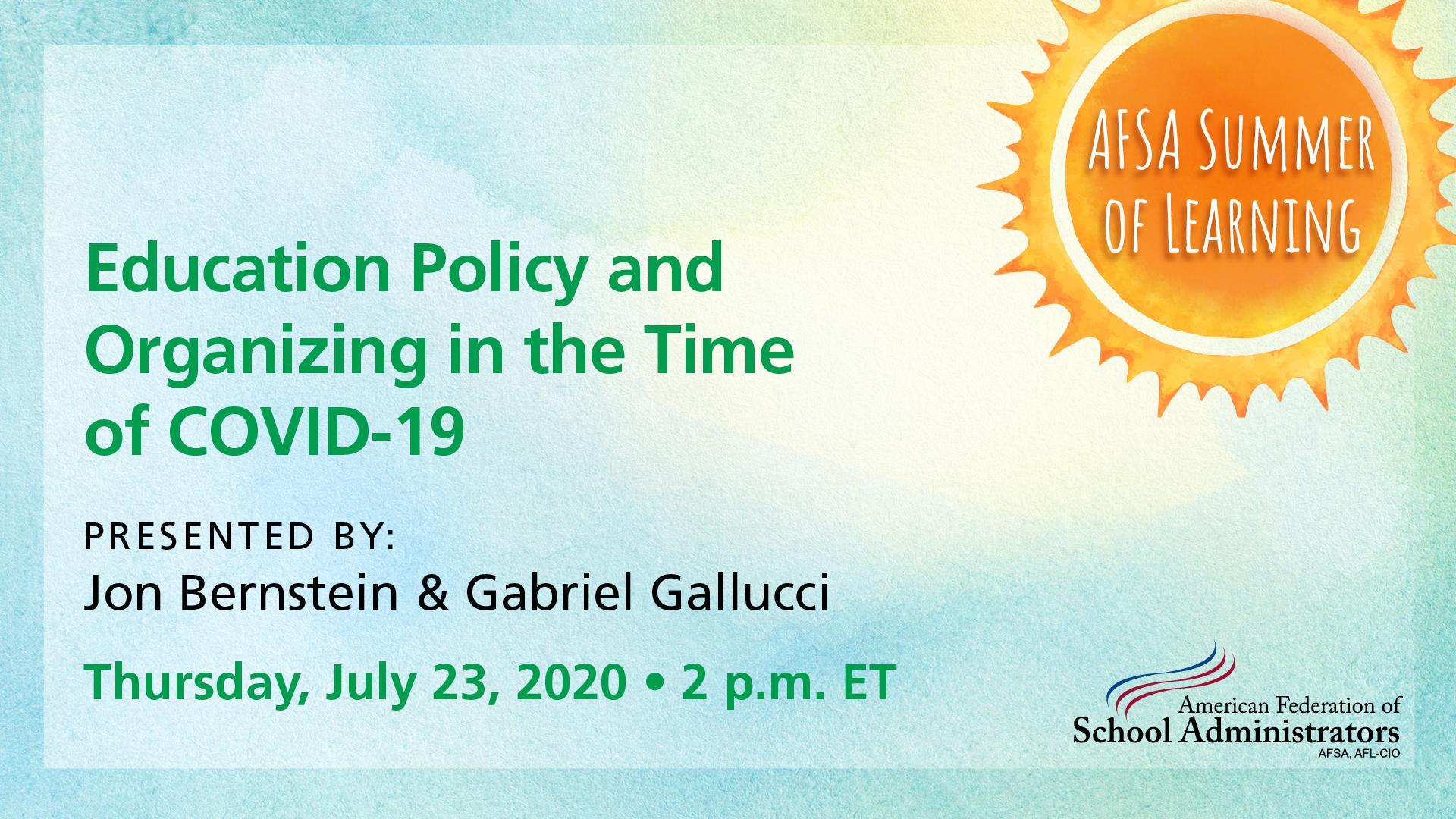Being politically inactive during this crisis is not an option. Administrators must clearly articulate the needs of their schools to policymakers.
To do so, we have to organize. Council of School Supervisors & Administrators (CSA), AFSA Local 1, Government Affairs Director Gabriel Gallucci and AFSA Political Strategist Jon Bernstein provided key insights into forming political action committees (PACs), as well as Washington’s recent COVID relief packages for schools.
Building Your Local’s PAC
Establishing a well-structured PAC is vital to amplifying your local’s voice. When your members contribute time and a modest amount of funding to lobbying and mentorship programs, you can better fight for increased salaries, pensions, health benefits and overall quality of life.
Your PAC must start with a powerful mission statement. Define the priorities of your union and how you will execute them through political engagement.
“It’s important to have a mission statement not only for your union, but to build out your PAC," Gallucci said. "In New York, we’ve created a mission statement that touches on all the issues, actions and campaigns that we host here.”
Gallucci outlined the essential tenets of creating an impactful, long-lasting PAC:
- Build: Before your union can influence other institutions, you need to fortify your organization. Intergenerational relationships are key; the older members will impart their wisdom and political connections to younger members, and in turn, younger members will provide fresh perspectives for engaging lawmakers and the community at large.
- Organize: Create a consistent agenda for your PAC. Conduct monthly or bimonthly meetings ranging from policy seminars to campaigns and to social hangouts. Your union must build coalitions with brother and sister organizations; the larger the coalition, the greater its authority. While we all miss in-person meetings, new technologies enable us to organize from home.
- Execute: Once you’ve cultivated relationships and educated members, it’s time to act:
- Lobbying is one of your most powerful tools. Get your members in front of lawmakers and have them share their stories. Have them explain why your district requires greater access to funding, improved after-school programs and broadband for all. Through effective lobbying, CSA has moved New York City to guarantee free lunch for all 1.1 million public school students, to crack down on vaping in schools, and more.
- Administrators aren’t just leaders within schools, they’re leaders within communities. Therefore, your union’s political endorsements carry weight. Take your time when screening candidates and ensure they uphold the values of your union.
During the presentation, CSA member Marybelle Ferreira shared her eye-opening experience joining her local’s PAC.
“Politics used to evoke feelings of mistrust," she said. "I only viewed it as negative until I joined my political action committee. When I became more active in lobbying days and meeting school politicians, it helped my understanding of government mechanisms and the positive side of politics.”
What is Happening at the Federal Level?
Your PAC should strive to influence all levels of government. Lobbying at the federal level helps to shape and move forward our national educational improvement initiatives.
Unfortunately, the federal government has failed to address the pandemic’s severe impact on schools.
President Trump has threatened to withhold federal funding from schools that do not resume in-person learning during this crisis.
“Now that we have witnessed it on a large-scale basis, and firsthand, Virtual Learning has proven to be terrible compared to In-School or On-Campus Learning. Schools must open in the Fall. If not, why would the federal government give funding?! It won’t,” the president tweeted.
While AFSA hopes for the reopening of schools, the organization prioritizes the safety and well-being of students, faculty and staff above all else. Our leadership supports expanding relief for schools, so they can continue providing excellent education and other vital services.
On March 27, Congress passed the CARES Act, allocating $13.5 billion and $14.23 billion for K–12 and higher education, respectively. The Act specifies funding shall provide “principals and other school leaders with the resources necessary to address the needs of individual schools.” However, only 1% of this funding has reached schools. States have been slow to move funds to districts and Education Secretary Betsy DeVos’ requirement that private schools receive funding has complicated distribution. As we move toward the fall, it is crystal clear that more funding is needed, and needed immediately.
“AFSA has been very active in this situation," Bernstein said. "We have signed on to a letter supporting $175 [billion] to $238 billion nationwide to support the reopening of school because that’s what we see as legitimate estimates of the costs for cleaning, for PPE [and for] making sure school infrastructures are sound,” he said. “We’ve also been supporting the notion that there are kids that are going to have to stay home, and there are teachers who are going to have to stay home, and that those folks need to be connected.”
In May, the House passed the HEROES Act, providing an additional $58 billion for K–12 and $32 billion for higher education. $1.5 billion has been dedicated to expanding home connectivity to narrow the “homework gap.” While this is an improvement, the funding falls short of the educational community’s proposed $175 billion for K–12 and $5 billion for home connectivity. The Senate’s proposed bill will be released soon.
What can you do?
Administrators are crucial to the fight for COVID relief. Schools need funding for PPE, intensive cleanings and tools for distance learning. Now is the time to call, text and write your representatives in Congress urging them to pass the HEROES Act. It’s our responsibility as school leaders to create safe and exceptional learning environments for students, no matter the circumstances.

